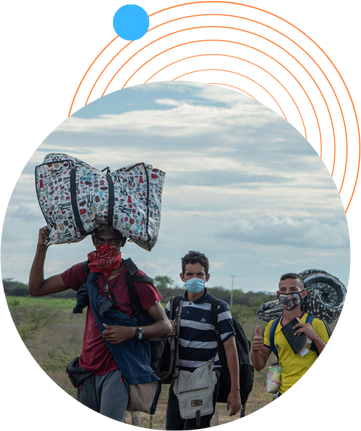Migration and Health in the Americas
Protecting the right to health and ensuring the equitable right to health of the migrant population
Within the site you will find various sources of documentation and information based on research carried out on Health and Migration in the Americas.
Migration has been a part of the experience of countries in the Region of the Americas at various moments throughout their history, as countries of origin, transit, or destination.
Social and political conflict, food insecurity, natural disasters, climate change, environmental degradation, economic hardship, violence, and other adverse drivers and structural issues have hindered people from building healthy and sustainable livelihoods and compelled them to seek better living conditions elsewhere for themselves and their families. These adverse drivers and structural issues have given rise to evolving dynamics in migration within the Region.
The information platform on health and migration in the Americas provides easy access to qualitative and quantitative evidence on health and migration gathered from research and information mapping exercises, and focused on knowledge management activities and interactive digital repositories.
The platform supports policy-making, the creation of training materials, development of public health interventions, and research initiatives on this topic. Its interactive dashboards systematize the information compiled on policy, legal, and regulatory frameworks, as well as the scientific literature on health and migration.
Interactive dashboards

The interactive dashboard maps the policy, legal, and regulatory frameworks on health and migration with a human rights-based approach in countries of the Americas, at the national and international levels. This resource is aimed at guiding decision-makers and actors from different sectors tasked with developing, updating, and improving policies, laws, legislative and regulatory frameworks, plans, and programs so that they include protection of the health of migrants in a comprehensive manner.

This interactive dashboard maps scientific articles on health and migration at the national and international levels in the countries of the Region of the Americas. It shows the current state of scientific literature on the health of migrants, refugees, and persons on the move in the Americas.

This interactive dashboard seeks to capture information collected by countries on the health of migrants to inform policy decision-making related to migrants in the Region of the Americas. Presents a summary of publicly available data points and methodologies used for data collection on various health topics, including year of collection and sources. The information displayed on the dashboard will be updated periodically. Additional countries will be added to the dashboard with the goal of expanding to as many countries as possible to get a more comprehensive view of the type of migrant health data points being collected in the region.
These measures are intended to serve as a resource for Member States to address public health and health systems challenges related to migration, including the promotion and protection of the health of migrants throughout their migration process. It aims to support the integration of the health needs of migrants into national health policies, strategies and programs, not only to protect the health of their health, but also that of the host population.
This line of action focuses on ensuring that national surveillance systems integrate considerations for both host and migrant populations. It seeks to ensure that information and disaggregated data are generated at regional and country levels (national and sub-national), and that adequate, standardized, and comparable records on the health of migrants are available to support policy- and decision-makers to develop more evidence-informed policies, plans and interventions. This will, amongst other things, support the adaptive capacity of health systems of destination countries and guide health interventions to address migrants’ specific health needs.
List of key interventions
This line of action focuses on increasing equitable access to comprehensive, timely, quality health services for all people, including the migrant population, without discrimination and with a people- and community- centered approach. It is essential to determine specific barriers to access and define specific interventions, for example, facilitating linguistic, intercultural, and financial support to improve access to health services for migrant and host populations. Existing mechanisms in place should be strengthened to increase health services capacity in areas with a high influx of migrant populations. Services should cover the continuum of care, including promotion, treatment, rehabilitation and palliation based on the health needs ascertained.
In general, migrants do not pose an additional health security threat to host communities. Initial screening— not limited to infectious diseases—can be an effective public health instrument, but should be nondiscriminatory and non-stigmatizing, and carried out to the benefit of the individual and the public; it should also be linked to accessing treatment, care and support. It is unlikely to be necessary if health systems are strong and capable.
List of key interventions
This line of action focuses on the provision of accurate information and dispelling of fears and misperceptions among migrant and host populations about the health impacts of migration and displacement on mobile populations, and on the health of local communities and health systems. It also seeks to build a culture of inclusion, solidarity and diversity, promoting the exchange of information (including epidemiological information), protocols, communication material and strategies, national plans, and relevant policy instruments among Member States.
List of key interventions
This line of action seeks to ensure that the determinants affecting migrants’ health are addressed through joint action and coherent multi-sectoral public health policy responses, including differentiated impacts among women and girls, children, and indigenous and afro descendant communities. It promotes synergy and efficiency through partnerships and intersectoral, intercountry, and interagency coordination and collaboration mechanisms, including with agencies within the United Nations System, such as PAHO, IOM, UNHCR, and UNWomen.
List of key interventions
This line of action targets the mainstreaming of migrant’s health in national agendas, and promotes migrant- sensitive health policies and legal and social protection, and the health and well-being of women, children and adolescents living in migrant settings. Given that gender and ethnicity can affect the reasons for migrating, as well as the social networks migrants use to move in host countries, there is a need to ensure equality approaches in national programs and policies, including the empowerment of migrant women and girls and gender equality.
It also advocates for the inclusion of migrant health in national and local policies and programs, as well as the development or modification of legal frameworks to address migrants’ right to the highest attainable standard of physical and mental health, in accordance with international human rights obligations, relevant international and regional instruments, and by working to lower or remove physical, financial, information and discrimination barriers in accessing health care services, in synergy with WHO’s partners, including non- State actors.
List of key interventions

(Only Spanish)
IOM: Data and Research
IOM: Environmental Migration Data and Resources
IOM MEXICO: Hub Regional para el Fortalecimiento de Capacidades sobre Migración y Salud
IOM: Global Compact on Safe, Orderly, and Regular Migration A/RES/73/195 (2019)
IOM: Migrants in transit through the Americas – DTM data [Dashboard]
UN Migration Network Hub
UNHCR: Global Compact for Refugees (2018)
UNHCR: Global Reports and publications
UNHCR: Venezuela Situation
UNICEF: Child Migration and Displacement
USAID: Los Angeles Declaration on Migration and Protection - Data Portal
Others:
Plataforma de Coordinación Interagencial para Refugiados y Migrantes (R4V)
Quito Process
CHILE: Red Chilena de Investigación en Salud y Migración - Datos Niños y niñas migrantes
Global Migration and Health Initiative (GloMHI) - University of Toronto
Lancet Migration: Global collaboration to advance migration and health
Video on the Working Conditions of Migrant Domestic Workers in Costa Rica, Peru, and Panama.
Video Presented at the 3rd WHO Global School on Refugee and Migrant Health - Chile´s Experience
Video Presented at the 3rd WHO Global School on Refugee and Migrant Health - Colombia´s Experience
Video Presented at the 2nd WHO Global School on Refugee and Migrant Health. Guatemala’s Experience
DISCLAIMER: PAHO does not offer any guarantee or assume any legal responsibility for the accuracy and/or veracity of the information contained in the materials compiled on this web page. PAHO will not assume any responsibility for claims arising from or derived from the use of the information contained in this web page.